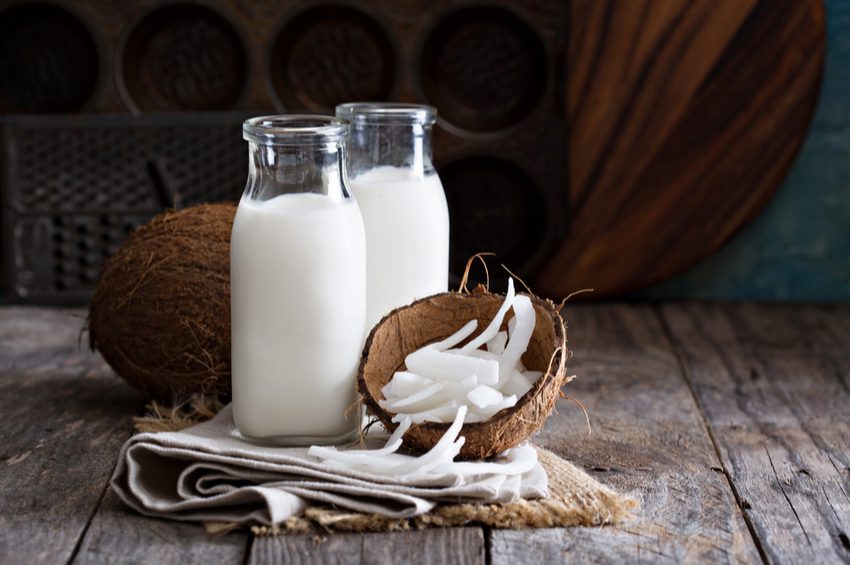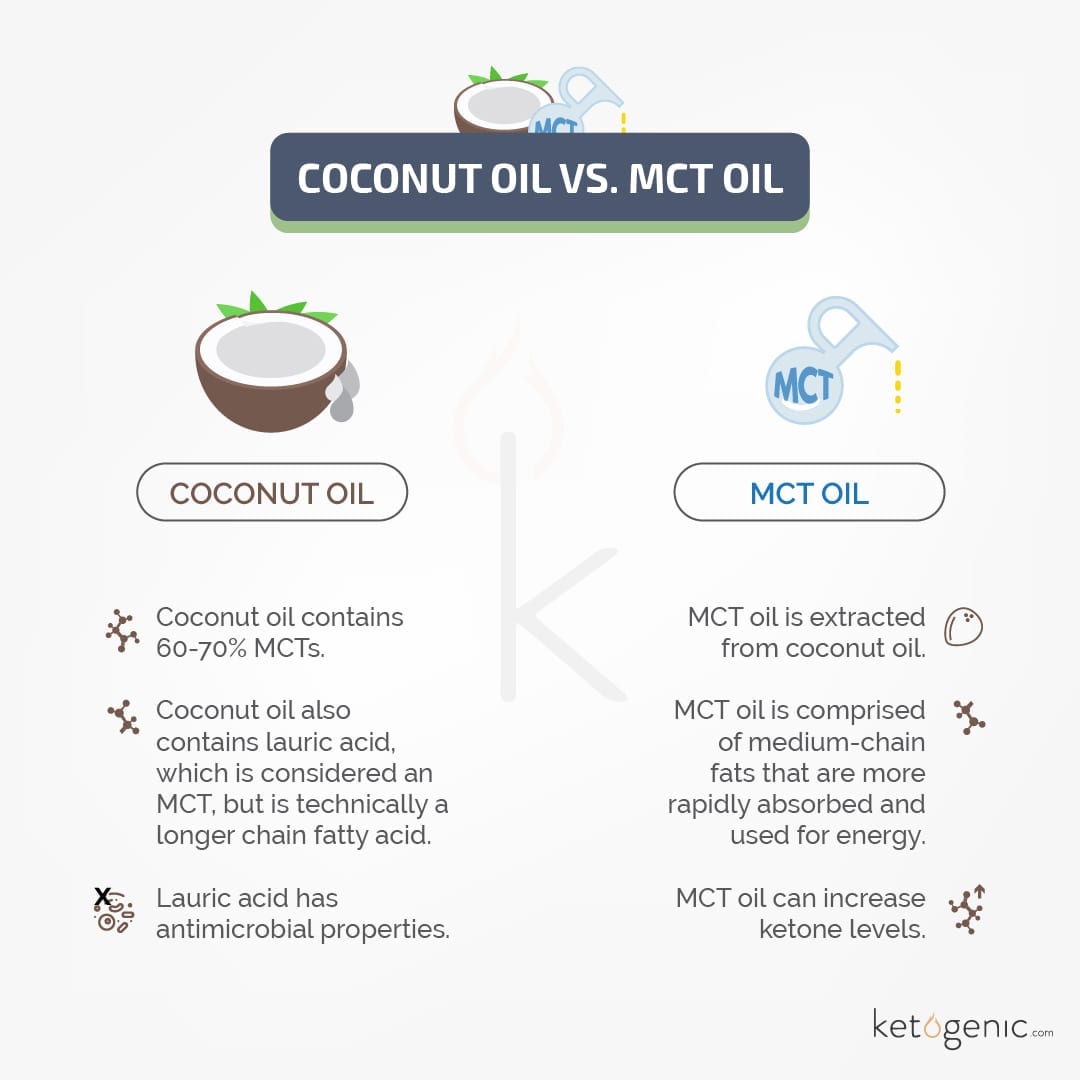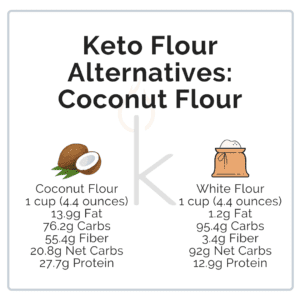
Coconut is a summer staple! It’s in almost every poolside cocktail or beachside appetizer. You might want to indulge in coconut this season but may not know if it’s keto or not. You have to limit most fruits on the ketogenic diet, but coconut is both a fruit and a nut. Since nuts are allowed on low-carb diets, can you have coconuts on keto?
Since coconuts come in so many different varieties, let’s break down the six of the most types, their nutrition facts, and whether or not they are acceptable on a keto diet!
1. Coconut Oil
While coconut may be a summer staple, coconut oil is a keto diet staple. Coconut oil is commonly consumed on a ketogenic diet because it is rich in medium-chain triglycerides (MCTs).
MCT oil is made from coconut oil. In fact, coconut oil contains around 70% MCTs. Additionally, coconut oil also contains long-chain fatty acids.
MCTs are fatty acids that have 6-12 carbons. These fatty acids are rapidly absorbed and converted into ketones.

MCT oil elevates ketone levels and provides energy for the body, which is why many ketogenic dieters consume MCT oil while fasting or throughout the day.
1 tbsp of coconut oil has 103.5 calories, 0g of carbohydrates, 11.5g of fat, and 0g of protein. Coconut oil is not only keto-friendly, but its consumption is highly encouraged on the ketogenic diet. [1]
Need an easy way to incorporate coconut oil into your diet? Here are some high-fat coconut oil containing recipes:




2. Coconut Milk
Coconut milk is made from mixing coconut pulp with water. The fattier cream rises to the top of this mixture and is removed to be used as coconut cream. The remaining bit is coconut milk. Because the fattier portion is removed, coconut milk is lower in fat and calories than coconut by itself.
Coconut milk is a dairy-free and lactose-free milk that is commonly used in place of regular milk when trying to cut down on calories, sugar, or fat. It is also a common weight loss alternative for 1% or skim milk.
Coconut milk is commonly sold in both a sweetened and unsweetened version. Obviously, on the keto diet, the unsweetened version is optimal.
One cup of unsweetened coconut milk contains 45 calories, 4.4g of fat, 1g of net carbs, and 0g of protein.
Coconut milk can be used in place of regular milk in most recipes. This even includes foods like cereal, and protein shakes. If you are still looking for recipes that include this milk, here are 3 keto-friendly ones you should try:
3. Coconut Cream
You’ve probably heard of coconut milk, but have you tried coconut cream? They are both made from the same ingredients (coconut and water), but coconut milk contains more water and less coconut than coconut cream. Since coconut cream contains more of the actual coconut and less water, it is higher in fat, thicker, and creamier. Because of this, coconut cream is commonly used in soups and ice creams.
1/2 cup of coconut cream contains 200 calories, 20 grams of fat, 3 grams of carbs, and 2 grams of protein.
Since coconut cream is packed full of healthy fats, you’ll definitely want to incorporate it on your keto diet! Try one of these recipes that feature coconut cream:
4. Coconut Water
Coconut water is simply made from the liquid inside of coconuts. While some pre-packaged coconut waters are sweetened, coconut water is not inherently high in sugar. 1 cup of unsweetened coconut water contains 44 calories, 10.4g of carbs, 0g of fiber, 0.5g of protein, and 0g of fat.
Since coconut water is higher in carbs and low in fat, it is typically avoided on a ketogenic diet. That being said, moderation is key. If you’d like to drink coconut water, opt for an unsweetened, smaller portion (like 1/2 cup). Make sure it fits in with your daily macros!
5. Shaved or Shredded Coconut
Coconut meat can be shaved or shredded to cream a wonderful texture. These coconut flakes are commonly used in keto desserts and are perfect a thick, coconuty treat.
Similar to the other coconut products, shredded and shaved coconut is also sold in both sweetened and unsweetened varieties. On the keto diet, it is best to select unsweetened coconut.
1 cup of unsweetened shredded coconut (similar in macros to shaved) contains 587 calories, 21g of total carbs, 11g of fiber, 10g of net carbs, and 5.3g of protein. While this may seem like a lot, that’s in an entire cup. Most keto recipes are not going to use that much.
Here are 3 absolutely delicious low-carb recipes that feature unsweetened coconut:
6. Coconut Flour
Lastly, we have coconut flour. Coconut flour is a common alternative to traditional white flour. It is a gluten-free alternative to traditional flour and can be used in place of almond flour.
Because coconut flour is highly absorbent, you will need less than almond flour. If substituting coconut flour for almond flour in a recipe, use 1/4 cup coconut flour for every 1 cup of almond flour. Adjust as needed.
1/2 cup of coconut flour contains 240 calories, 32g of total carbs, 20g of fiber, 12g of net carbs, 8g of fat, and 8g of protein.
12g of net carbs may seem high, but similar to shredded coconut, that is a large quantity. Most recipes will not include this much in a serving.

Coconut flour is keto-friendly and is used in many different keto recipes. If you’re looking to incorporate coconut flour into your diet, here are 3 tasty recipes you should try:
Do You Enjoy Coconuts On Keto?
What’s your favorite coconut recipe? Comment below and share your ideas with the community!
References
FoodData Central Search Results. FoodData Central. (n.d.). https://fdc.nal.usda.gov/fdc-app.html#/food-details/330458/nutrients





















